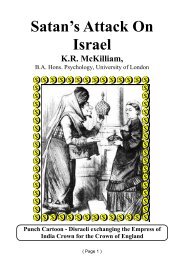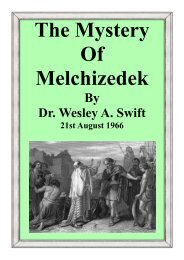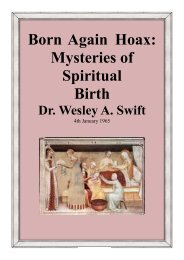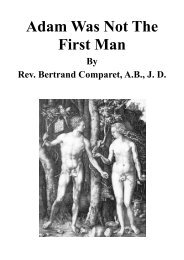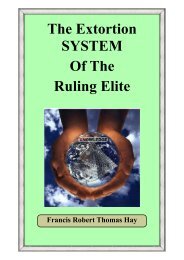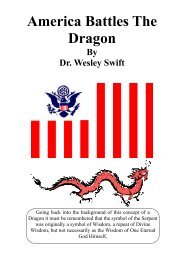Curse of Cannan - The New Ensign
Curse of Cannan - The New Ensign
Curse of Cannan - The New Ensign
You also want an ePaper? Increase the reach of your titles
YUMPU automatically turns print PDFs into web optimized ePapers that Google loves.
Congress, but only by delegates chosen by these three groups. Collier's notes that after Grant<br />
was elected President in 1868, "It was important to maintain Radical Republican governments<br />
<strong>of</strong> the southern states because these corrupt organizations provided votes for the Republican<br />
Party. Largely for this reason, the Fifteenth Amendment was passed by Congress and its<br />
ratification made a condition for readmission to the Union for Virginia, Mississippi, Texas, and<br />
Georgia. <strong>The</strong> Reconstruction governments in the South could only be sustained by force."<br />
Thus Collier's makes a definitive statement about the Fifteenth Amendment, that it was passed<br />
by blackmail <strong>of</strong> the Southern states, and that it was merely a political ploy <strong>of</strong> the Republican<br />
Party to maintain its political power. <strong>The</strong> reason that these brutal and alien state governments <strong>of</strong><br />
the Masonic Canaanites could only be sustained by force was because <strong>of</strong> their unwavering hatred<br />
and brutality toward the people <strong>of</strong> Shem. Military and Federal courts whose dicta can be enforced<br />
only by martial law can hardly be welcomed by any people. <strong>The</strong> military occupation <strong>of</strong> the South<br />
was similar to the present military occupation <strong>of</strong> East Germany, Czechoslovakia, and other<br />
European nations by the Soviet armies. An alien ideology was imposed on a defeated people by<br />
brute force. <strong>The</strong> Thirteenth Amendment to the Constitution <strong>of</strong> the United States was enacted in<br />
1865 by martial law. <strong>The</strong> Fourteenth Amendment was enacted in 1868 by martial law. <strong>The</strong><br />
Fifteenth Amendment was enacted in 1870 by martial law. Military occupation <strong>of</strong> the Southern<br />
states did not end until 1877, twelve years after the end <strong>of</strong> the Civil War. <strong>The</strong> occupation was<br />
maintained throughout those years solely as a punitive measure, in the hope <strong>of</strong> starving to death<br />
the last white survivors <strong>of</strong> the Civil War. Thus we find that the Thirteenth Amendment, enacted<br />
in 1865, during military occupation, abolished slavery; the Fourteenth Amendment, which<br />
changed the status <strong>of</strong> citizenship in the United States, was enacted in 1868 during the military<br />
occupation; and the Fifteenth Amendment, dictating voting procedures, was enacted in 1870<br />
during the military occupation. <strong>The</strong>se amendments were similar to orders issued by the Soviet<br />
commanders today in East Germany or in Czechoslovakia. In 1868, when the Fourteenth<br />
Amendment was ratified, Great Britain was still shipping boatloads <strong>of</strong> political prisoners to the<br />
Swan River in Western Australia as slave labor. Many <strong>of</strong> them were "Irish politicals," who were<br />
deported to wipe out popular resistance to the British occupation <strong>of</strong> Ireland.<br />
<strong>The</strong> Civil Rights Act <strong>of</strong> April 9, 1866, stated, "Be it enacted, that all persons born in the United<br />
States and not subject to any foreign power, excluding Indians not taxed, are hereby declared to<br />
be citizens <strong>of</strong> the United States." This Act nullified Art. 1, Sec. 2, Cl. 3 <strong>of</strong> the Constitution<br />
defining "free persons"; even so, the Civil Rights Act continued the exclusion <strong>of</strong> "Indians not<br />
taxed" from citizenship. This Act also excludes all members <strong>of</strong> the Masonic Order from<br />
citizenship, because they are subject to a foreign power.<br />
<strong>The</strong> state <strong>of</strong> martial law under which these three amendments to the Constitution were ratified<br />
was authorized by the First Reconstruction Act, dated March 2, 1867: "Whereas no legal State<br />
governments or adequate protection <strong>of</strong> life or property now exists in the rebel states," the ten<br />
Southern states were thereby divided into five military districts. President Johnson vetoed the<br />
bill on the same day, noting that "<strong>The</strong> bill places the people <strong>of</strong> the ten States therein named under<br />
the absolute domination <strong>of</strong> military rule but each State does have an actual government." Johnson<br />
further noted that the commanding <strong>of</strong>ficer is "an absolute monarch," which was a clear violation<br />
<strong>of</strong> the provisions <strong>of</strong> the Constitution. He also said, "This is a bill passed by Congress in time <strong>of</strong><br />
peace [the war had been over for two years]." He further noted the absence <strong>of</strong> "either war or<br />
insurrection" and that laws were already in harmonious operation in the Southern states. Johnson<br />
concluded his veto message as follows: "<strong>The</strong> Constitution forbids the exercise <strong>of</strong> judicial power<br />
in any way but one-that is, by the ordained and Established courts." Thus Johnson excluded the<br />
exercise <strong>of</strong> military courts in the Southern states.<br />
<strong>The</strong> Second Reconstruction Act, dated March 23, 1867, established military control over voting<br />
in the Southern states. Free elections, anyone? President Johnson again vetoed it the same day.<br />
"No consideration could induce me to give my approval to such an election law for any purpose,<br />
and especially for the great purpose <strong>of</strong> framing the Constitution <strong>of</strong> a State." <strong>The</strong> bill was passed<br />
over his veto.<br />
( Page 82)




